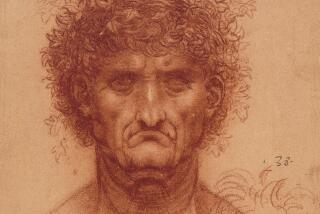Review: ‘Christ Stopped at Eboli’ is classic Italian cinema at its finest
Both profound and approachable, epic and emotional, “Christ Stopped at Eboli” is a masterwork Americans never got to see by a director, Italy’s Francesco Rosi, who’s never received proper respect in this country.
Fortunately, those injustices can now be remedied as a restoration of 1979’s complete, uncut three-hour-and-40-minute “Eboli,” as rich and magisterial as the day it debuted, is screening for the first time.
Based on a celebrated memoir by Carlo Levi, first published in the U.S. in 1964 and never out of print, it examines the more than a year the Italian writer spent in internal exile in the 1930s as an outspoken opponent of Mussolini’s fascist regime.
Made for Italian television in four 55-minute parts, it boasted a terrific cast, including Gian Maria Volonté, Lea Massari and Irene Papas.
And its off-screen talent included not only Rosi but some of the top names in Italian cinema: co-writer Tonino Guerra, composer Piero Piccioni and Oscar-winning cinematographer Pasqualino De Santis.
That didn’t prevent “Eboli” from being released in the U.S. in a badly truncated two-hour cut that pleased no one, a lack of recognition that was par for the course for Rosi.
The problem has not been that the director, who died in 2015 at age 92, did not do excellent work: A filmography that includes “Salvatore Giuliano,” “Hands Over the City,” “The Moment of Truth” and “The Mattei Affair” (which won the Palme d’Or at Cannes in 1972) is beyond reproach.
Rather it’s partly that Rosi, unlike say Fellini or Antonioni, didn’t have an easily definable style and partly that the tendencies he did exhibit — toward humanistic, socially conscious films with a political edge, the very traits that make “Eboli” so remarkable — were not necessarily what Americans wanted to see.
“Eboli” begins with the train, bus and car journey Levi (played with a piercing intensity by Volonté, later a Sergio Leone favorite) takes to get to the remoter-than-remote Lucania region, stunningly photographed by De Santis, on the instep of the Italian boot.
The village of Gagliano where he’s to be exiled is so off the radar that the locals joke that even Christ himself ventured no further than Eboli — the closest train station but still a great distance away.
This area, deep in Italy’s impoverished South, is especially alien territory to Levi. His elegant suit and scarf mark him as an urban sophisticate from Turin, in the country’s industrialized north. He may share a language with these people, but that’s about it. Or so he thinks.
Like a piece of classic literature, “Eboli” has a three-part dramatic structure that mirrors Levi’s actions and state of mind.
Initially, the writer is dazed and confused in these radically new surroundings, simply trying to get his bearings as he meets notables like the town’s ambitious mayor and the alcoholic priest who has contempt for his flock.
Levi’s biggest shock is learning that the local people have so little faith in the town’s two doctors that they swarm him when they learn he has a medical degree even though he has never practiced.
Gradually, Levi becomes more acculturated to his surroundings. He takes naps in freshly dug graves — the coolest spots in town — and is befriended by a gregarious group of men who’ve returned to their birthplace after living in New York City, a place they feel closer to than Rome.
Finally, following a visit from his sister Luisa (Massari), Levi takes a more active role in the community, moving to his own home and finding Giulia (Papas), the only woman in the area morally allowed to clean an unmarried man’s house because she’s already had 17 children from 17 men.
Forming a distant backdrop to all of this is Italy’s imperialistic invasion of Ethiopia, an action which does not find much favor. “If they have so much money in Rome,” someone suggests, “why don’t they spend it here.”
One of the great treats of “Eboli” is its lyric, immersive character, the way it slows down and draws us into its world absolutely. This is a film that takes its time and is the better for it, that allows us to slowly sink into things, much as Levi himself does.
Finally, Levi comes to understand and convey what desperation does to people, how feeling subjugated and outside of history leads the downtrodden to embrace the fascism of the moment.
It may have taken a long time for “Christ Stopped at Eboli” to get here, but, like most great art, it speaks to our moment as well as its own.
--------------
‘Christ Stopped at Eboli’
Not rated
Running time: 3 hours, 40 minutes
Playing: Laemmle’s Royal, West Los Angeles; also Thursday at Laemmle’s Playhouse, Pasadena
More to Read
Only good movies
Get the Indie Focus newsletter, Mark Olsen's weekly guide to the world of cinema.
You may occasionally receive promotional content from the Los Angeles Times.









